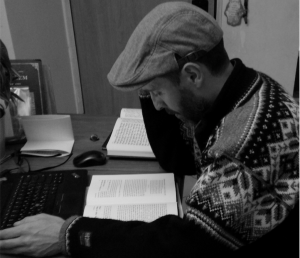Having Faith or Wrestling with God, Alone
Twenty years ago, after having lived on a religious kibbutz for about a year, I decided it was time to go learn somewhere. It was time to learn Judaism. I chose, for a number of reasons, the hesder yeshiva of Shilo. It was a very challenging experience, but most of all that was a time of self-fashioning for me – I was determined to consolidate my Jewish identity. And that is what I did, for about sixteen hours a day.
Of course, that came with an enormous psychological price. It all felt extremely artificial, all extremely alien.
I had access, as a student there, to the computers for a few hours a week to respond to emails I would exchange with my Dad and Mom in Rome. Once I expressed all the angst and difficulty, I described my long discussions on Rav Soloveitchik, the complexity of the Talmudic disputes, and the disgust I felt for the political positions the kids and the teachers had there, and I expressed my solitude. Yeah, solitude. It all felt very different from who I was, and it made me feel lonely. My dad once wrote back with this sentence: “I called you Yaakov after one of the three paradigms of humanity. Look at God and fight back. That is who you are.” It didn’t make me feel better at the time, and I don’t think I understood what he meant – but it slowly matured inside of me. Because Yaakov is he who fights back, he who wrestles with ideas and presence and faith and truth.
When Yaakov fights with a “man” in Genesis 32:25 he does so unprovoked, with no apparent reason. “And a man wrestled with him until the break of dawn.” The man too, fights him with no apparent provocation. Yaakov and this man, possibly an angelic impersonation of the Divine, wrestle with one another – and there is a perfect balance between the two. And when the man sees that he had not prevailed or could not prevail against him, he wrenched Yaakov’s hip at its socket, so that the socket of his hip was strained as he wrestled with him.
A limping and impaired Yaakov is he who not only wrestles with the Divine, but can also dispute with him. Yaakov is the one who will not let go, and who becomes Israel for he has “striven with beings divine and human, and has prevailed” – for, ultimately, it is only by fighting, wrestling, giving nothing for granted, and by gnawing at ideas that one can hope to see the divine face to face. Limping is indeed difficult, and so is wrestling with God, with yourself, with accepted ideas around you. Belief is not a matter of acceptance, of justifying contradictions in the infinite and ever-changing complexity of this universe – it is, rather, more a matter of challenging, of disputing verbally, of wrestling with the simple gratuitous nature of good and bad around us, taking responsibility for things, sharing the suffering and the joy of our neighbor. Belief is a tenuous balance joining and separating two fighting individuals, an equilibrium which inevitably lapses to either one or the other side. And ultimately, the truth of things in not to be found in the entirety of a well-wrought existence, but rather in the limping imperfection of a tired and sleepless Yaakov.
*Yaakov Mascetti holds a Ph.D. and teaches at the Department of Comparative Literature, Bar Ilan University.

